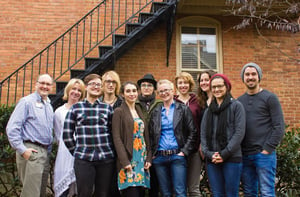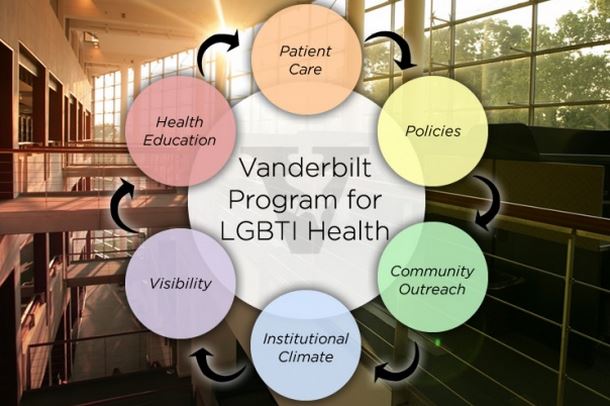We waited in the thick summer air, just outside the emergency room entrance. The parking garage was mostly empty, no one passed by, and the only sound was the rhythmic sliding of the automatic doors at our backs. Others may have been scared by the emptiness of the night; to us, standing outside of the ER seemed far more comfortable than the alternative: entering the hospital. We debated whether our health was worth the risk of being told again, “We can’t help you here.”
This experience is not new to me. I had been receiving calls for medical advice on a weekly basis from transgender people who were scared to go to the hospital. As an out transgender graduate student and Associate Director of The Program for LGBTI Health at Vanderbilt University, many local transgender people had heard that I could help them find a doctor. For several years, Program Co-director Kristen Eckstrand and I stayed up all night in the ER with strangers, helped people find flu shots and providers for sexual health screenings, and, one night, convinced a suicidal transgender woman in rural Tennessee to stay on the line until a friend could take her to the hospital. We quickly learned that the needs of our community were greater than we could take on by ourselves.
Indeed, the challenges that face my community are more than one person can solve. When accessing healthcare, a third of transgender people report delaying primary care visits due to fear of discrimination. When transgender people do decide to access healthcare, they often educate providers and clinic staff, because transgender healthcare basics are not uniformly included in health professions education. When coupled with the anxiety and fear that comes from interfacing with a healthcare system that is designed for cisgender people, from intake forms and electronic medical records to gender-specific restrooms and inpatient beds, many transgender people have had negative experiences in healthcare settings and are afraid to seek out care when they need it.
The Trans Buddy Program is changing this. We are a patient support and advocacy network specifically for transgender individuals. The Trans Buddy Program, designed and led by Kristen Eckstrand, Lauren Mitchell, and myself, is the product of a deep-rooted commitment to empowering transgender patients in healthcare. This commitment, held by trans- and cisgender individuals alike across Vanderbilt University Medical Center and the Vanderbilt Program for LGBTI Health, led to the launch of Trans Buddy in January 2015.

Point Scholar Kale (third from the left) and the other Trans Buddy participants.
The program is modeled after peer-to-peer healthcare support networks, such as HIV/AIDS advocates who worked in hospitals during the height of the AIDS crisis, and doulas who provide support to people across the spectrum of pregnancy outcomes. The Trans Buddy Program trains community volunteers who attend clinical visits with transgender patients- providing emotional and logistical support, an extra set of ears for clinician instructions, and a friendly face in the ER or waiting room. Trans Buddies support patient choices to discuss preferred gender pronouns and names with front desk staff and clinicians, and help facilitate communication between providers and patients, who often speak very different languages when it comes to topics as complex as gender identity. Volunteers are a diverse group of committed, compassionate transgender people and allies. Although new, the program has already helped many patients access healthcare that would not otherwise have felt comfortable doing so.
Despite being built within an academic medical system, the Trans Buddy Program relies on the sophisticated word-of-mouth support networks formed by transgender people regarding how to access resources like healthcare. The program is successful because we partner closely with these networks, listen to the needs of local transgender people, rely on their expertise, and create opportunities for transgender leadership. Patients are the core of patient advocacy, and our program is dedicated to empowering transgender patients to make their own informed health choices.
| This post was written by Point Scholar Kale Edmiston |
 Kale is a Ph.D. candidate in neuroscience at Vanderbilt University, where he studies the neuroendocrine system, stress, and social behavior. As part of his dissertation work, he helps run a musical theatre camp for children and adolescents with autism spectrum disorders. Kale is the first out transgender graduate student at Vanderbilt University and in 2014 was elected president of the Neuroscience Student Organization. Kale is a Ph.D. candidate in neuroscience at Vanderbilt University, where he studies the neuroendocrine system, stress, and social behavior. As part of his dissertation work, he helps run a musical theatre camp for children and adolescents with autism spectrum disorders. Kale is the first out transgender graduate student at Vanderbilt University and in 2014 was elected president of the Neuroscience Student Organization.
He has a longstanding interest in improving health care access for transgender people, and has provided transgender health care training to providers across the country since 2004.
|

